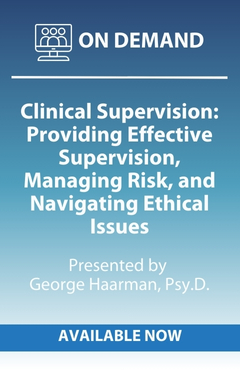Description
This workshop is on-demand, content will be available immediately after purchase.
Footage and all course content (certificate, videos, quiz) will be available until May 31, 2025. Extensions cannot be granted under any circumstances.
Registration will close on May 26, 2025.
This two-day course was developed for experienced, post-graduate, licensed clinicians who are interested in or have been providing clinical supervision. It is an intermediate level course designed to introduce practitioners to best practices for providing clinical supervision. The presentation reviews models of clinical supervision and discusses the advantages and disadvantages of each model, details building blocks for the provision of competent supervision, discusses individual versus group supervision, suggests various observation models to enhance feedback and demonstrates constructive feedback strategies. As supervision is often a multicultural experience, potential supervisors are taught to identify personal values, biases and expectations and utilizes skills, techniques and strategies for supervising diverse populations. Every discipline recognizes the importance of clinical supervision in training new practitioners and has established specific guidelines related to supervision, this course reviews the major ethical issues involved in supervision, discusses key legal issues associated with supervision and provides specific risk management strategies to address these ethical and legal issues
This experiential, in-depth seminar details the supervisory process, answers your questions about ethical issues, risk and liability, and prepares you to deliver competent clinical supervision.
Day One
8:30 – 8:45 Introduction
8:45 – 9:45 Section I – Getting Started: How to Optimize the Initial Supervision Sessions
9:45 – 10:00 Break
10:00 – 11:50 Section II – The Supervisory Alliance: Building a Foundation for Everyone’s Success
11:50 – 1:00 Lunch
1:00 – 2:30 Section III – Models of Clinical Supervision: Find the Right Fit for You and Your Setting
2:30 – 2:45 Break
2:45 – 3:45 Section IV – The Evaluation Process: The Key to Effective Supervision
3:45 – 4:00 Questions & Prep for Tomorrow
Day Two
8:30 – 8:45 Recap
8:45 – 9:45 Section I – Giving Effective Feedback: Having Hard Conversations
9:45 – 10:00 Break
10:00 – 11:45 Section II – When Problems Arise: Resolving Supervisor/Supervisee Tensions, Cultural Competence
11:45 – 12:55 Lunch
12:55 – 2:30 Section III – Ethical and Legal Issues in Supervision: Protect Yourself, Your License, Your Agency and Your Client
2:30 – 2:45 Break
2:45 – 3:45 Section IV – Ethical and Legal Issues in Supervision: Protecting Yourself, Your License, Your Agency and Your Client
3:45 – 4:00 Questions & Evaluation
Clinical Professionals: All mental health professionals including, but not limited to Clinical Counsellors, Psychologists, Psychotherapists, Social Workers, Nurses, Occupational Therapists, Hospice and Palliative Care Workers, School Counsellors, Youth Workers, Mental Health Workers, Addiction Specialists, Marital & Family Therapists, Speech Language Pathologists, Vocational Rehabilitation Consultants and all professionals looking to enhance their therapeutic skills.
George B. Haarman, Psy.D., LMFT, is a Licensed Clinical Psychologist and a Licensed Marriage and Family Therapist currently in private practice. He received his doctorate in clinical psychology from Spalding University and is a member of the American Psychological Association. Dr. Haarman has been an instructor at Jefferson Community College, Bellarmine University, and Spalding University. He has presented seminars regionally and nationally on psychopathology, depression, and emotional disorders in children and adolescents. George serves as a consultant to several school systems regarding the assessment of children. His prior experience includes working with youth detention centers, juvenile group homes, child protective services, and juvenile probation.
| Registration | Early bird Fee | Regular Fee |
|---|
| Individual Enrollment | 469.00 | N/A |
| | |
All fees are in Canadian dollars ($CAD).
Group rates and student rates are available. Please contact webinars@jackhirose.com for more information.





